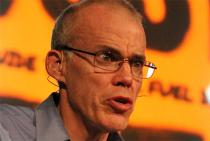A big test for the Paris agreement is taking place this week at the United Nations General Assembly, where all countries are to present their national climate plans, a process that ends in Belém, Brazil at the UN Climate Change Conference (COP30) later this year. Despite the depressing state of climate debates today, I am optimistic that the collective spirit built over the last decade is now quietly but deliberately working to consolidate and build upon the gains that have been made. The Paris agreement is one that all countries – whether fossil-fuel producers, island states, or the world’s wealthiest economies – negotiated and ratified in record time. It combines effective measurement and monitoring with flexibility for countries to determine and devise their own plans to confront climate change.
You are here
Results for fossil fuels
Monday 16 September 2019
London, United Kingdom
The global transition from carbon-intensive fossil fuels to cleaner, more reliable renewables like wind and solar is already well underway. But the big question – for the 2020s and beyond – is how fast it will happen. A slow transition would mean that energy-sector incumbents continue to flourish, and we would all but certainly miss the emissions-reduction targets enshrined in the 2015 Paris climate agreement. But if the transition is rapid, incumbents will experience varying degrees of disruption – the price of keeping the Paris targets well within reach. As matters stand, both scenarios are possible, representing two paths that lie before us.
Thursday 13 September 2018
 Premium content
Premium content
Stanford, USA
Although the details of global warming were foreign to most people in the 1980s, among the few who had a better idea than most were the companies contributing the most to it. Despite scientific uncertainties, the bottom line was this: oil firms recognized that their products added CO2 to the atmosphere, understood that this would lead to warming, and calculated the likely consequences. And then they chose to accept those risks on our behalf, at our expense, and without our knowledge. By Benjamin Franta
Tuesday 11 September 2018
London, United Kingdom
This year, extreme weather conditions have ravaged our planet, subjecting vulnerable communities around the world to the ever-increasing impacts of climate change. With each passing day, we learn more about – and experience directly – the dangerous consequences of extracting and burning fossil fuels. Floods, droughts, and wildfires are becoming deadlier, and weather patterns more severe. By Christiana Figueres and May Boeve.
Tuesday 9 May 2017
Ripton, Vermont
Last month, the United Kingdom enjoyed its first full day without the need for coal power since the Industrial Revolution began. That’s remarkable news – and a sign of the future to come as the country that began humanity’s centuries-long romance with burning black rocks is now moving on. Just as the fax gave way to email and whale oil gave way to kerosene, so is coal giving way to cleaner forms of energy. And that handover will happen faster – perhaps fast enough to let us at least slow down the pace of climate change – if the massive and mighty insurance industry would play its part.








